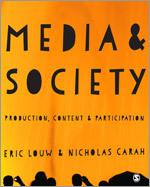Student Resources
Guide to reading journal articles
Throughout the book we cite work by scholars in the field, and we encourage you to go and read their work to extend your thinking, consider our point of view, and come to a view of your own. This book, like all academic publication, is not a stand-alone work. It is situated in a broader academic debate. Understanding how academic publication works and how to read journal articles will help you make better sense of the ideas and arguments in this book.
Free SAGE journal articles
Taylor (2007) explores the changing nature of the music industry.
Wilken (2014) offers an account of the development of social media industries and platforms.

